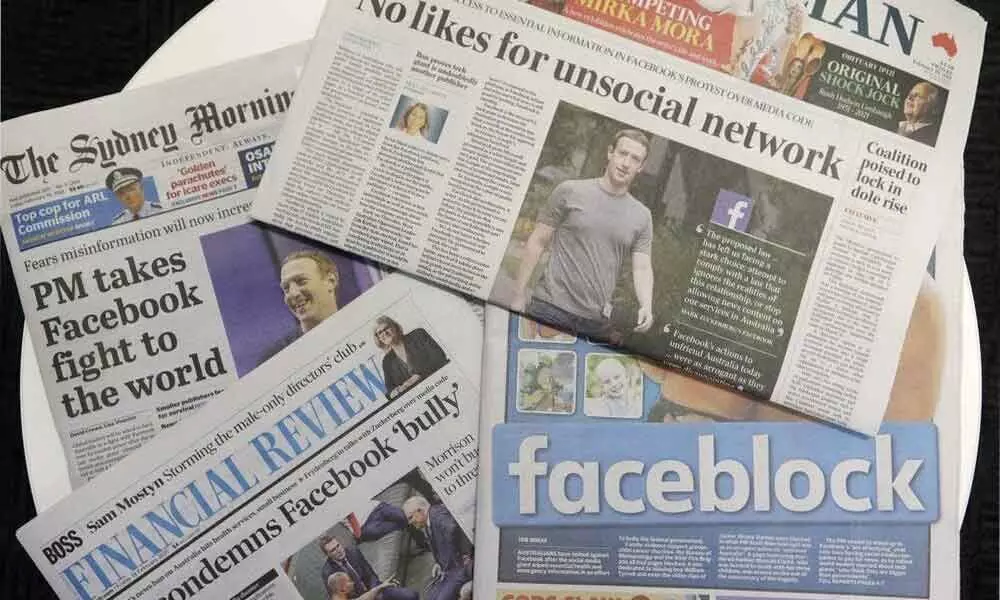Live
- They always want me to win, and now I feel lucky to have been offered a story like ‘Zebra’: Satyadev Kancharana
- ‘Democracy first, humanity first’: PM Modi in Guyana's parliament on two countries' similarities
- PKL Season 11: Telugu Titans register third straight win to top standings
- Is Pollution Contributing to Your COPD?
- NASA Unveils Underwater Robots for Exploring Jupiter's Moons
- Additional Central forces arrive in violence-hit Manipur
- AR Rahman and Saira Banu’s Divorce: Legal Insights into Common Issues in Bollywood Marriages
- 82.7 pc work completed in HPCL Rajasthan Refinery area: official
- Curfew relaxation extended in 5 Manipur districts on Friday
- Tab scam prompts Bengal govt to adopt caution over fund disbursement
Just In
US media portrayal of India during cold war mirrored US policies: Study


With India being portrayed negatively in the mainstream American press during the ongoing Ukrainian conflict, mainly because New Delhi has refused to toe the US line, a recent research of media reporting during the Cold War has concluded that the American media has by and large followed the official US government policy when it comes to India.
Washington: With India being portrayed negatively in the mainstream American press during the ongoing Ukrainian conflict, mainly because New Delhi has refused to toe the US line, a recent research of media reporting during the Cold War has concluded that the American media has by and large followed the official US government policy when it comes to India. The study, titled 'US national interests and framing India in the US press during and after the Cold War', spanning 48 years of US media coverage of India, found that the US government and the press opposed India's proximity to the Soviet Union.
Published recently by The Journal of International Communication, the research conducted by Abhijit Mazumdar, an assistant professor at Park University in the United States, is a result of a two-year research project wherein the NRI professor studied hundreds of The New York Times and The Washington Post news articles about India.
"As one perused US media stories about India during the Cold War one could sense the hugely anti-India narrative in them," Majumdar told PTI. The US media portrayal of India mirrored United States governmental policies on India and showed that US foreign policy has a major impact on the US media's international reportage, he said. "The research found that the US press portrayed India as a strategic opponent of the nation during the Cold War, but the same media outlets depicted India as an ally of the United States after the Cold War in line with US foreign policy," he said.
Unlike many other leading powers, India has not yet criticised Russia for its invasion of Ukraine and it abstained from the votes at the UN platforms in condemning the Russian aggression. However, India abstained on a resolution pushed by Russia on the humanitarian crisis in Ukraine recently, which was seen as reflective of its neutral position on the conflict. India has been pressing for the resolution of the crisis through diplomacy and dialogue.
According to the published paper, the study uncovers the fact that the US media portrayed India according to the policies of the US government during and after the Cold War. "In keeping with journalist traditions of objectivity and fairness in reportage, this study recommends that the US press should try to also include views in their news stories that are not espoused by top officials of the US administration," he writes.
"In doing so, the US press would accord more objectivity and generate more trust in their reportage," Mazumdar concluded. According to Mazumdar, the research found there were significant differences in India's overall portrayal between Cold War and post-Cold War era in five key areas: defence ties, trade, nuclear programme, terrorism and separatist movements in India.
The US media during the Cold War supported defence ties between the US and Pakistan while opposing any military help to India, Mazumdar said.
"The 1971 war between India and Pakistan was a case in point where the US government and the press went into an overdrive to criticise India," he added. Similarly, the US government and the press viewed the Pokhran nuclear test in 1974 with suspicion, he said. Terrorism in Kashmir and Punjab was viewed in the US press more as a human rights issue involving minorities.
However, the kidnapping and the subsequent killing of Western tourists in Kashmir in 1995 changed the attitude of the US government and its media in India's favour as it grappled with the escalating tide of international terrorism, Mazumdar said. The outright US media support on Kashmir was evident until 2015, he said in a statement. While the US media roundly criticised India's nuclear quest during the Cold War, the same media outlets supported the US government's nuclear deal with India in 2005, he noted.
"Compared with US media's stinging castigation of India's nuclear test in 1974, The New York Times and The Washington Post were less scathing in rebuking India for the nuclear tests (in 1998)," the Park University professor said. Mazumdar attributed the subservience of the US press to its own government in international reporting to its 44th rank on the World Press Freedom Index. "Supporting its own government in international reporting may be a reason for the US media getting a comparatively low rank on the World Press Freedom Index," he said.

© 2024 Hyderabad Media House Limited/The Hans India. All rights reserved. Powered by hocalwire.com






